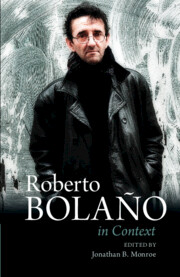Book contents
- Roberto Bolaño in Context
- Roberto Bolaño in Context
- Copyright page
- Contents
- Contributors
- Chronology
- Part I Geographical, Social, and Historical Contexts
- Part II Shaping Events and Literary History
- Chapter 9 France, Spain, 1938
- Chapter 10 The Cold War
- Chapter 11 After the Fall of the Wall: 1989–2001
- Chapter 12 Latin American Literature
- Chapter 13 French Connections
- Chapter 14 German and Russian Precursors
- Chapter 15 After the Two 9/11s: Santiago, 1973, New York, 2001
- Part III Genres, Discourses, Media
- Part IV Aesthetics, Culture, and Politics
- Further Reading
- Index
Chapter 14 - German and Russian Precursors
from Part II - Shaping Events and Literary History
Published online by Cambridge University Press: 15 December 2022
- Roberto Bolaño in Context
- Roberto Bolaño in Context
- Copyright page
- Contents
- Contributors
- Chronology
- Part I Geographical, Social, and Historical Contexts
- Part II Shaping Events and Literary History
- Chapter 9 France, Spain, 1938
- Chapter 10 The Cold War
- Chapter 11 After the Fall of the Wall: 1989–2001
- Chapter 12 Latin American Literature
- Chapter 13 French Connections
- Chapter 14 German and Russian Precursors
- Chapter 15 After the Two 9/11s: Santiago, 1973, New York, 2001
- Part III Genres, Discourses, Media
- Part IV Aesthetics, Culture, and Politics
- Further Reading
- Index
Summary
In what would prove to be his last interview, Bolaño named for Monica Maristain the books that had marked his life. Alongside works in Spanish, English, French, and Latin, he also named Franz Kafka’s novels, the Aphorisms of Lichtenberg, and the Tractatus by Wittgenstein. This troika can be supplemented with Russian authors mentioned repeatedly in works and essays, for example Anton Chekhov and Fyodor Dostoevsky. This chapter enumerates and analyzes Roberto Bolaño’s deep and persistent engagement with German and Russian literatures, and tries to make sense of a fundamental difference in the two repertoires: most of the Russian authors mentioned or alluded to in Bolaño’s work are recognized names in world literature read and appreciated by non-specialists, whereas his chosen German authors range from immortals such as J. W. von Goethe to long-forgotten names like Heinrich Lersch and Max Barthel. It is no surprise that these two literary traditions join in dialectical fashion in Bolaño’s magnum opus, 2666, where a German, Hans Reiter, derives literary inspiration from the diary of a Russian Jew, Boris Abramovich Ansky. The two literatures struggle with each other as do the two armies to cognitively map the evils of the 20th century.
Keywords
- Type
- Chapter
- Information
- Roberto Bolaño In Context , pp. 158 - 168Publisher: Cambridge University PressPrint publication year: 2023



